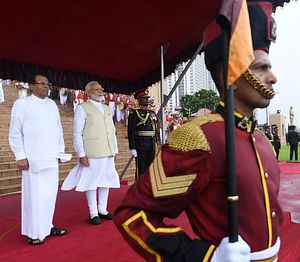The first overseas visit of Indian Prime Minister Nadrendra Modi to the Maldives and Sri Lanka, in his second term, following a landslide electoral victory, is an “important symbolic gesture reflective of the special relationship” between the countries.
However, it is important to examine these visits in the context of Modi’s earlier engagements with Indian Ocean states. In March 2015, in his first term, Modi was the first Indian prime minister to visit the Seychelles in 34 years and Sri Lanka in 28 years. During that tour of the Indian Ocean region, he did not visit the Maldives, at the time under President Abdulla Yameen’s pro-China regime.
Modi’s Indian Ocean region visit was hailed by the media as “the beginning of the end of [India’s] self-inflicted strategic myopia” in the region. Indian political leaders of the 20th century had largely demonstrated a continentalist mindset. Diplomatically, this led to a perceived almost complete neglect of the Indian Ocean region for several decades. Even Modi’s much overdue visit in 2015 did little to improve India’s standing in the region or halt the growing China’s economic and political influence in India’s maritime neighborhood.
By 2018, China’s influence in Sri Lanka, the Maldives, and Bangladesh had expanded significantly, much to the detriment of India’s bilateral security relationships and strategic interests. The pro-China Maldivian government under Yameen had gone to the extent of asking India to remove its gifted helicopters and crew from the country and even “banned” Indian workers from entering the country. In 2014, Sri Lanka, under the Rajapaksa government, openly hosted a PLA Navy submarine and by then had already established deep economic ties with China.
The level of Chinese strategic influence and political sway in India’s neighborhood seems to have shaken the government into action and following frantic efforts to back a pro-India regime in Sri Lanka and the Maldives, and massive funding to offset the Chinese “debt trap” in these countries, India’s position in the region is much stronger than before.
Modi’s latest state visits to the Maldives and Sri Lanka took place in a changed environment. In the Maldivian capital Male, Modi was accorded a grand welcome and conferred the country’s highest honor for foreign dignitaries by President Mohamed Solih. Another significant highlight of the visit was Modi’s address to the newly constituted People’s Majilis, the parliament. A large number of memorandums and agreements were signed with a focus on expanding maritime security cooperation covering hydrography, exchange of white shipping information and a coastal radar system linking the Maldives to India’s larger surveillance network. Furthermore, Solih and Modi jointly inaugurated a training facility for the Maldives National Defence Force in Maafilaafushi.
Following his visit to Male, Modi visited Sri Lanka, where he similarly received an extraordinary welcome with the Sri Lankan Prime Minister Ranil Wickremesinghe present to personally receive him at the airport. In Sri Lanka, Modi paid homage to those who died in the Easter Sunday attacks, reaffirming India’s solidarity with the government of Sri Lanka in their fight against terrorism. Bilateral discussions during the visit centered around counterterrorism, security, and economic development. Modi’s visit to the Maldives and Sri Lanka clearly demonstrates a strengthening of India’s position and a redeeming of political authority in the region, an effort at reversing the strategic influence gained by China in recent years.
However, at this stage, it is imperative that past lessons of neglecting bilateral ties with the Maldives and Sri Lanka are not forgotten. It is important that India rapidly move beyond the usual bilateral security engagements toward larger strategic goals of establishing a long-term military commitment in these countries. Pacifist thinking on part of the Indian polity — a legacy of the Nehruvian era which seems to have lingered on under the subsequent Congress led governments — appears to have curtailed initial efforts to convert political and diplomatic successes of the 1980s in the Maldives, Sri Lanka, Mauritius, and the Seychelles, where India has intervened militarily, to establish long term naval presence in those countries.
In this regard, India has much to emulate from the Chinese approach of expanding maritime power in the Indian Ocean region. In less than a decade since 2009, when the PLA Navy first entered the Indian Ocean, China commissioned a full-fledged and fortified naval base at Djibouti in 2017, with additional facilities likely to come up in other African states. Clearly, China’s assertive projection of maritime power compared to India’s benign approach has accorded China a “quick win” in the region and it is expected that China will work toward consolidating its position in the wider region. A similar approach by India to establish a logistics facility to support naval operations or routine basing of ships and aircraft or a training facility to support ongoing cooperative efforts in the Maldives and Sri Lanka could be viable options that must be considered.
Following the success of Modi’s visit to the Maldives and Sri Lanka, India is once again presented with an opportunity to expand its military influence in the region. A key lesson from the past has been that exercising benign leadership remotely from New Delhi could be unsustainable in the long-term. Thus, it is paramount that India must take urgent and proactive steps to build upon the current relationship and progress towards establishing a long-term military commitment in both countries. Or else, India could once again lose its influence to China.
Dr. Shishir Upadhyaya is a former Indian naval officer, PhD (International and Security Studies) from the University of Wollongong, Australia.

































